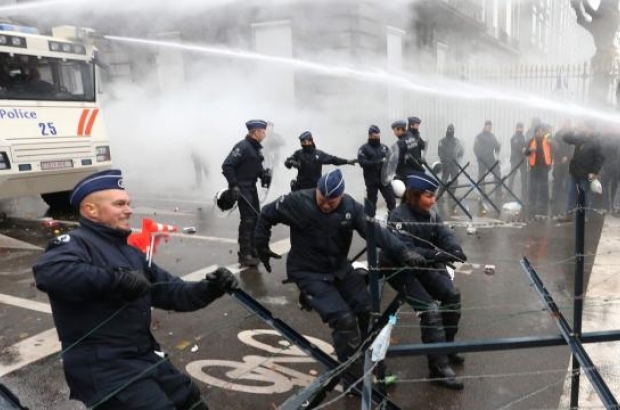- Daily & Weekly newsletters
- Buy & download The Bulletin
- Comment on our articles
Interior minister calls for tougher policing during protests
Belgium’s interior minister Bernard Quintin (MR) has asked the police to take "stricter accompanying measures" during upcoming demonstrations following the damage caused in Brussels during last week’s national demonstration.
Defence minister Theo Francken (N-VA) had previously suggested using supposedly less lethal weapons such as FN303 semi-automatic riot guns against rioters. However, according to Minister Quintin, this should be strictly limited to cases of self-defence, when someone's physical integrity is directly threatened.
“Belgium is not the Wild West,” Quintin said, adding that police and the Crisis Centre are analysing the events in order to learn the necessary lessons.
“For the upcoming demonstrations, I have asked the police to consider stricter accompanying measures, while respecting the right to demonstrate. The aim is to better assess the risks, strengthen coordination with organisers and better tailor the use of resources to new forms of mobilisation.”
Quintin also wants the police to be better able to anticipate potential rioters and will therefore create a legal framework for the use of Open Source Intelligence (OSINT) which involves collecting and analysing information from public sources that are accessible to everyone, with the aim of picking up signals about preparations for violence or infiltrations more quickly.
Some politicians expressed support for stricter measures during protests and demonstrations while others offered criticism.
“These are not ordinary demonstrators, these are people who commit criminal acts under the banner of the extreme left,” said Maaike De Vreese (N-VA).
"This violence is absolutely unacceptable. We must dare to discuss what means we will use to combat it and what legal framework is needed for that."
But Rajae Maouane (Ecolo) questioned Quintin about the attitude of the police, who she said did not shy away from using force during the demonstration.
Business owners in Brussels, meanwhile, are not waiting. More companies are increasing the number of security guards they employ due to what they describe as a "growing threat" from activist groups protesting in the capital.
Eight out of ten security managers (81%) say that activists pose a physical risk to their companies and executives in Belgium.
The European average is significantly lower at 73%, according to G4S's World Security Report 2025, which the security firm has been compiling since 2023.
“Companies are definitely concerned when protests are announced and ask us to scale up the number of security guards at those times,” said Caroline Reding, sales and marketing director at G4S Belgium.
“For some companies, this means doubling the number of security guards. For other companies in high-tech sectors, it even means quadrupling the number of security guards.”
Almost half (48%) of those surveyed said that threats against top managers have increased over the past two years. Belgium again scores well above the European and global average of 42%.
The companies surveyed also anticipate spending more money on security, with 74% indicating that they will increase their budget for physical security.
The report surveyed 58 security managers from Belgium, out of a total of 464 in Europe. The survey was conducted in Belgium, Austria, Denmark, Estonia, France, Germany, the Netherlands and the United Kingdom.



















